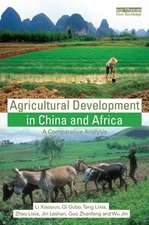From Jicama to Jackfruit: The Global Political Economy of Food: International Studies Intensives
Autor Kimberly A. Weiren Limba Engleză Hardback – 30 mai 2014
Din seria International Studies Intensives
- 46%
 Preț: 159.19 lei
Preț: 159.19 lei -
 Preț: 296.34 lei
Preț: 296.34 lei -
 Preț: 408.54 lei
Preț: 408.54 lei - 15%
 Preț: 459.43 lei
Preț: 459.43 lei -
 Preț: 489.99 lei
Preț: 489.99 lei -
 Preț: 409.48 lei
Preț: 409.48 lei - 26%
 Preț: 764.87 lei
Preț: 764.87 lei -
 Preț: 360.10 lei
Preț: 360.10 lei -
 Preț: 411.42 lei
Preț: 411.42 lei -
 Preț: 348.77 lei
Preț: 348.77 lei -
 Preț: 430.37 lei
Preț: 430.37 lei - 22%
 Preț: 353.80 lei
Preț: 353.80 lei - 17%
 Preț: 258.59 lei
Preț: 258.59 lei -
 Preț: 384.59 lei
Preț: 384.59 lei -
 Preț: 381.72 lei
Preț: 381.72 lei - 18%
 Preț: 1161.28 lei
Preț: 1161.28 lei -
 Preț: 348.77 lei
Preț: 348.77 lei -
 Preț: 408.88 lei
Preț: 408.88 lei - 17%
 Preț: 255.37 lei
Preț: 255.37 lei -
 Preț: 380.86 lei
Preț: 380.86 lei -
 Preț: 369.73 lei
Preț: 369.73 lei -
 Preț: 286.84 lei
Preț: 286.84 lei -
 Preț: 363.96 lei
Preț: 363.96 lei -
 Preț: 462.60 lei
Preț: 462.60 lei
Preț: 819.48 lei
Preț vechi: 1102.53 lei
-26% Nou
Puncte Express: 1229
Preț estimativ în valută:
156.83€ • 160.60$ • 130.45£
156.83€ • 160.60$ • 130.45£
Carte tipărită la comandă
Livrare economică 19 martie-02 aprilie
Preluare comenzi: 021 569.72.76
Specificații
ISBN-13: 9781594519307
ISBN-10: 1594519307
Pagini: 222
Dimensiuni: 152 x 229 x 19 mm
Greutate: 0.43 kg
Ediția:New.
Editura: Taylor & Francis
Colecția Routledge
Seria International Studies Intensives
Locul publicării:Oxford, United Kingdom
ISBN-10: 1594519307
Pagini: 222
Dimensiuni: 152 x 229 x 19 mm
Greutate: 0.43 kg
Ediția:New.
Editura: Taylor & Francis
Colecția Routledge
Seria International Studies Intensives
Locul publicării:Oxford, United Kingdom
Recenzii
"Didactic tools like review questions, recipe boxes, and sidebars featuring 'new-to-you foods,' situate the book as an undergraduate text for a US student. Accordingly, the writing is clear, straightforward, and engaging. Scholars from other fields will find the book a good overview, and will be grateful for the endnotes. . .Summing Up: Recommended. Lower-division undergraduates and above; general readers."
—CHOICE
“This book brings a new and different perspective to a topic that will become increasingly salient and attract more attention as people around the world—in both developed and developing countries—focus on the quantity, quality, and variety of their food. The author does an excellent job of motivating the topic throughout the book, especially with features like ‘New-to-You Food.’”
—Moonhawk Kim, University of Colorado at Boulder
“An enticing and interesting read reflecting the innovative pairing of food crops with dimensions of the global political economy. This book will be a popular addition to the limited available offerings in circulation today.”
—Shelley L. Hurt, California Polytechnic State University
“An interesting approach to dissecting key questions in global political economy using food as a lens. . . .[this book] provides an accessible avenue for students to make sense of global issues.”
—Noah R. Zerbe, Humboldt State University
—CHOICE
“This book brings a new and different perspective to a topic that will become increasingly salient and attract more attention as people around the world—in both developed and developing countries—focus on the quantity, quality, and variety of their food. The author does an excellent job of motivating the topic throughout the book, especially with features like ‘New-to-You Food.’”
—Moonhawk Kim, University of Colorado at Boulder
“An enticing and interesting read reflecting the innovative pairing of food crops with dimensions of the global political economy. This book will be a popular addition to the limited available offerings in circulation today.”
—Shelley L. Hurt, California Polytechnic State University
“An interesting approach to dissecting key questions in global political economy using food as a lens. . . .[this book] provides an accessible avenue for students to make sense of global issues.”
—Noah R. Zerbe, Humboldt State University
Cuprins
Chapter 1 Food and You; Chapter 2 The Food Chain; Chapter 3 Spices; Chapter 4 Cocoa Beans; Chapter 5 Soy; Chapter 6 Tomatoes; Chapter 7 Tuna; Chapter 8 Food for Thought;
Descriere
What did you have for breakfast? Did you ever stop to think about the people and steps involved with how your banana or cereal got on your plate? Nearly everyone is a part of the global food system, yet few people are aware of how it operates












